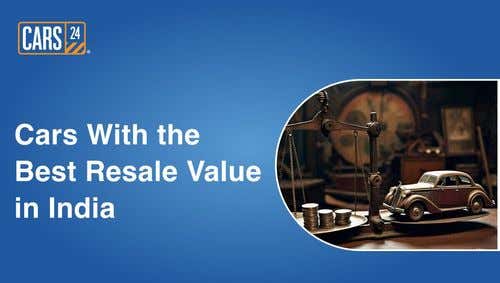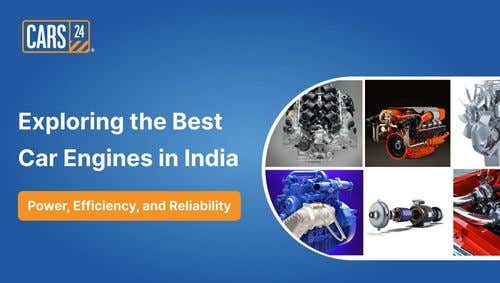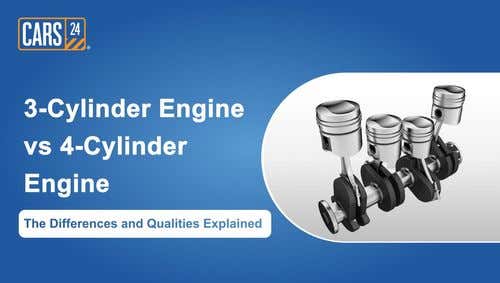How Do You Maintain A Second Hand Car In India in 2024

Updated on: 6th January, 2024 IST

Welcome to our guide to maintain your used car with ease. In the words of Shri Nitin Gadkari, India's Minister of Road Transport and Highways, the nation's used car market is on the verge of an impressive upswing, anticipated to thrive at a remarkable compound annual growth rate (CAGR) of 15-20% in the forthcoming five years. This thriving market is set to become a deciding factor in fulfilling the growing need for personal mobility across the nation.
Buying a pre-owned car is a smart financial decision that many Indians are making. It’s an affordable and more practical alternative to buying new cars. However, ensuring that your pre-owned vehicle remains reliable and safe requires diligent maintenance.
Whether you're a seasoned driver or new to the world of used cars, maintaining a second-hand car doesn't have to be a complicated ritual. In this blog, we're going to simplify car maintenance for you, ensuring that your ride stays pristine and reliable without any unnecessary headaches.
We'll cover the essential post-purchase checks and provide expert tips for a trouble-free ride. Join us as we explore the world of used car care, tailored to the unique conditions of Indian roads, and guarantee that your vehicle continues to shine bright like a diamond. Let's get started!
Also Read: 10 Engine Maintenance Tips
Table of Contents
Second-Hand Car Maintenance Tips
Maintaining a second-hand car is crucial for its longevity and performance. There are a few easy yet effective ways to maintain your second-hand car in India, where the road conditions can be challenging.
Here are some of the most essential used car maintenance tips:
1. Inspect Service History
- Collect and review the car's service records and ownership history
- This helps assess the vehicle's maintenance and any prior issues, providing valuable insight into its condition
2. Oil Changes
- Regular oil changes are vital for your car's engine health
- Follow the manufacturer's recommendations for the type of oil and change intervals, usually indicated in kilometres (e.g., every 8,000-11,000 km)
3. Filter Replacements
- Air and cabin filters must be replaced as required
- Clogged filters can compromise engine performance and impact the quality of air inside the car
4. Check Fluid Levels
- Regularly inspect and top up essential fluids like coolant, brake fluid, and power steering fluid
- Low fluid levels can lead to severe problems like increased heat and poor performance
5. Tyre Care
- Ensure proper tyre pressure and alignment, crucial for safe driving on Indian roads
- Rotate your car tyres every 10,000-13,000 km to promote even wear and extend their lifespan
6. Brake Health
- Pay close attention to your car's brakes
- Squeaking, grinding noises, or a spongy pedal indicate the need for brake pad replacements or other essential brake system repairs
7. Battery Check
- Examine the battery terminals for corrosion and ensure a secure connection
- Replace the battery if it's old or unreliable, considering the frequent start-stop traffic in Indian cities
8. Timing Belt and Chains
- If your car is equipped with a timing belt or chain, adhere to the manufacturer's guidelines for replacement
- It is usually recommended at 60,000-1,00,000 km intervals to avoid catastrophic engine damage
9. Suspension and Alignment
- Listen for unusual noises while driving, and promptly have the suspension and steering components inspected if any issues arise
- Proper alignment is essential for tyre longevity and safe handling on India's diverse road surfaces
10. Comprehensive Cleaning
- Regularly clean and wax your car's exterior to protect it from the elements and prevent rust, which can be a significant issue in India's varied climates
- Don't overlook the interior—clean and vacuum it to maintain a comfortable and hygienic driving environment
Also Read: CNG cars maintenance guide
Benefits of Maintaining a Second-Hand Car
When it comes to second-hand cars, there's much more than meets the eye. These vehicles offer a range of advantages that extend beyond their initial purchase.
Let's take a closer look at some of the most compelling reasons why maintaining a second-hand car is a smart choice:'
1. Avoiding Depreciation
- With a second-hand car, you sidestep the substantial depreciation that new cars experience
- Unlike new cars that experience rapid depreciation, your second-hand car's value has likely steadied
- This means you won't have to fret over significant monthly depreciation hits, allowing you to plan your budget more effectively
2. Lower Insurance Premiums
- Older cars generally come with lower insurance premiums
- Insurance companies consider used cars to be less risky, resulting in cost savings for you
3. Fewer Loan Worries
- If you purchased your used car without a loan, you won't have the burden of monthly payments
- This can free up your finances for other needs and investments
4. Customisation Opportunities
- Older cars offer more opportunities for customisation and personalisation without the fear of voiding warranties
- You can tailor your vehicle to your preferences and needs
5. Easier Maintenance
- With experience in the market, mechanics are often more familiar with common issues in older models
- This can translate to lower maintenance costs and less downtime for your car
6. Spare Parts Availability
- Parts for older models are usually more readily available and less expensive than those for newer vehicles
- This not only makes repairs easier but also more budget-friendly
7. Lower Registration Fees
- Some regions offer lower registration fees for older cars
- Delhi offers a 15% registration fee discount for vehicles over 15 years old
- Karnataka, Maharashtra, Punjab, and Tamil Nadu provide a 50% registration fee discount for vehicles over 15 years old
- This reduction in ongoing costs of ownership can make a significant difference in your overall expenses
8. Environmental Benefits
- Keeping an older car on the road can be environmentally friendly
- It reduces the demand for manufacturing new vehicles, which has a significant environmental impact
- By extending the life of your car, you contribute to environmental preservation
Also Read: Top 10 Low Maintenance Cars in India
Tips to Maintain Your Used Car
Ensuring the longevity of your used car involves more than just the initial inspection; it requires ongoing care. Here are some expert tips to keep your vehicle in prime condition:
1. Regular Check-ups
- Schedule periodic check-ups with a trusted mechanic to catch potential issues early
- Preventive maintenance saves you from major repair bills down the road
2. Use Quality Parts
- Opt for high-quality, genuine, or OEM (Original Equipment Manufacturer) parts when replacements are needed
- These parts might be a bit pricier but ensure better performance and durability
3. Avoid Overloading
- Don't burden your car with excessive weight as it can strain the suspension and lower fuel efficiency
- Stick to recommended weight limits
4. Fuel Quality
- Use high-quality fuel from reputable sources to maintain engine health
- Quality fuel prevents carbon deposits and engine-knocking
5. Maintain a Clean Interior
- Regularly clean the interior to prevent wear and tear on upholstery, dashboard, and seats
- Sunshades shield the interior from sun damage, preserving its appearance
6. Address Issues Promptly
- Respond promptly to unusual noises, warning lights, or performance problems
- Timely repairs prevent minor issues from escalating into major, costly problems
7. Invest in Insurance
- Comprehensive insurance offers financial protection in case of accidents, theft, or unforeseen events
- It safeguards both your car and your wallet, providing peace of mind on the road
Also Read: Best Summer Car Maintenance Tips
Things to Regularly Check To Maintain A Second-Hand Car?
Maintaining a second-hand car is a continuous commitment to ensure its longevity and reliability. Regular checks and maintenance play a pivotal role in achieving this goal.
Here are ten essential aspects to regularly monitor and maintain:
| Aspect | Maintenance | Importance and Benefits |
| Fluid Levels | Check engine oil, coolant, transmission fluid, brake fluid, and power steering fluid regularly Top up fluid levels as needed to keep the car running smoothly | Ensures proper engine function and smooth operation |
| Tyre Pressure | Maintain proper tyre pressure as per manufacturer specifications Proper tyre pressure ensures even wear, better fuel efficiency, and safer handling | Improves tyre longevity, fuel economy, and safety |
| Brakes | Regularly inspect brake pads, rotors, and brake lines for wear and tear Address brake issues promptly to ensure safety | Essential for safe stopping and vehicle control |
| Lights | Check headlights, taillights, brake lights, and turn signals regularly Ensure they are all working correctly for visibility and safety | Crucial for visibility and signalling to other drivers |
| Battery | Examine the battery terminals for corrosion and ensure a secure connection A well-maintained battery prevents starting issues | Reliable starting and electrical system performance |
| Belts and Hoses | Inspect belts and hoses for signs of wear, cracks, or leaks Replacing them as needed prevents breakdowns and engine damage | Prevents engine damage and breakdowns |
| Exhaust System | Listen for unusual noises from the exhaust system Check for rust or holes, as these can affect emissions and performance | Ensures emissions compliance and engine performance |
| Air Filter | Replace the air filter when it becomes dirty or clogged A clean air filter maintains engine efficiency and fuel economy | Improves engine efficiency and fuel economy |
| Steering & Suspension | Pay attention to any steering or suspension issues, such as pulling to one side or unusual vibrations Addressing these problems ensures a comfortable and safe ride | Maintains vehicle stability and ride comfort |
| Wipers & Washer Fluid | Replace wiper blades as needed to maintain clear visibility during rain or snow Keep the washer fluid topped up for effective windshield cleaning | Ensures clear visibility in adverse weather conditions |
Also Read: Top 10 Tips to Keep your Car in a Healthy Condition
The Bottom Line
In conclusion, maintaining your second-hand car is essential for its longevity and your safety. Consistently checking fluid levels, tyre pressure, brakes, lights, battery, belts, hoses, exhaust system, air filter, steering, suspension, wipers, and washer fluid ensures that your car remains reliable on Indian roads.
Regular maintenance not only prevents unexpected breakdowns but also enhances your overall driving experience. So, keep these maintenance tasks in mind to enjoy a smooth and trouble-free ride with your cherished second-hand vehicle. Happy driving!
FAQs
Q. What are the disadvantages of maintaining a second-hand car?
Disadvantages of maintaining a second-hand car can include higher repair costs due to wear and tear, potential issues with older parts, and increased fuel consumption as the car ages.
Q. What precautions should be taken when maintaining a second-hand car?
Precautions when maintaining a second-hand car involve regular checks of essential components, timely servicing, addressing any unusual sounds or issues promptly, and keeping detailed maintenance records for reference.
Q. How to maintain a used hand car in India?
To maintain a used car in India, follow a regular maintenance schedule, prioritise oil changes, inspect the brakes and tyres, keep an eye on fluid levels, and ensure compliance with emission and pollution control norms.
Q. Is it good to maintain a second-hand car in India?
Maintaining a second-hand car in India can be a good choice if you invest in regular upkeep. It can offer significant cost savings compared to buying a new car, especially considering depreciation rates and affordability factors.
Recently Added Cars to Buy
Other Blogs
- Recent
- Featured
Popular Cities to Sell Car
























